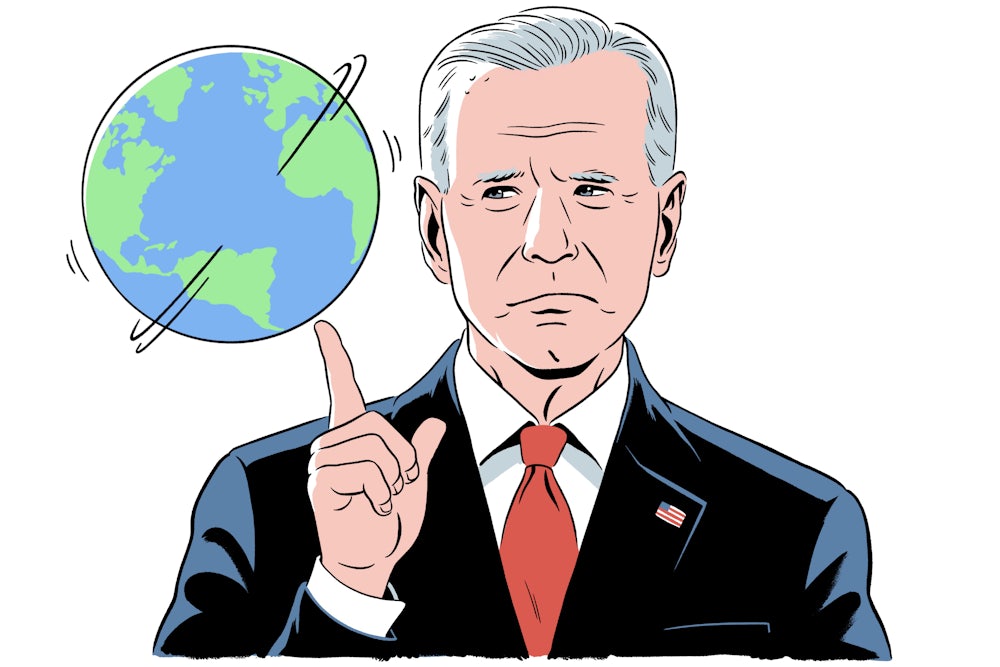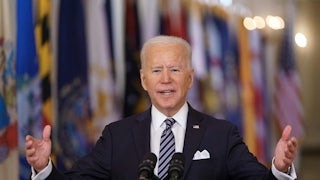During his presidential run, Joe Biden was sometimes viewed as a creature of the foreign policy establishment. For progressives, “Biden appears to be a man of the past: an unapologetic champion of American exceptionalism,” Foreign Policy reported in June 2020. But by the time he took office, he had proposed a significant reorientation of how the United States should operate abroad. Beneath the surface of his “America is back” slogan, Biden and his advisers understood important realities—that a diminishing share of global power limited what the United States could accomplish; that decades of corporate-led trade policies have diminished the livelihoods of too many Americans; and that climate change, pandemic preparedness, and anti-corruption are central national security challenges. He was also responsive to a growing constituency in the Democratic Party calling for a less militaristic international posture, and broader dissatisfaction in the country with 20 years of the expensive and destabilizing global war on terrorism.
Rather than vowing to revert to the same old model of U.S. leadership that preceded Donald Trump, the Democrats’ 2020 party platform pledged to “reinvent it for a new era.” Indeed, the Biden team recognized that Trump had exploited a gap between D.C.’s foreign policy apparatus and the lives of most citizens. “We’ve reached a point where foreign policy is domestic policy, and domestic policy is foreign policy,” Jake Sullivan said shortly before becoming national security adviser. “The alliances we rebuild, the institutions we lead, the agreements we sign, all of them should be judged by a basic question: Will this make life better, easier, safer for families across this country?”
Halfway into his first term, Biden has often proved an adept manager of U.S. foreign policy in the face of major challenges. He made a necessary and difficult decision to withdraw U.S. troops from Afghanistan. He responded shrewdly to Russia’s invasion of Ukraine. He has moved U.S. policy in the right direction on climate change.
Yet progress under Biden has been incremental rather than fundamental. Unless his administration recovers its initial, reformist insights, Biden will miss his opportunity to put U.S. foreign policy on a more peaceful and strategic footing, and risk handing deepening problems to a potentially dangerous successor.
Following the 2020 primaries, Biden led Democrats in rewriting the party’s platform in an effort to reconcile the ethos of the Obama years with a growing left in the party’s base. That produced a document with bolder ideas than the typical platitudes and minor reworkings trotted out every four years—and the foreign policy section was no exception. Released during the party’s convention that August, the platform document promised to “end our forever wars,” highlighting America’s military involvement in Afghanistan and Yemen as well as its wider counterterrorism footprint.
In his first two years in office, Biden has made remarkable strides. He rightly brought U.S. troops home from the failing two-decade war in Afghanistan and rejected “major military operations to remake other countries.” Although the last days of the conflict were wrenching, the United States conducted one of the largest and most effective aerial evacuations in history. Nor was there any good way to lose a war to the Taliban. Hawks lamented the absence of a “decent interval” following America’s departure, but that would have extended the civil war, killing more Afghans only to produce the same Taliban victory.
Biden deserves partial credit for reducing U.S. support for Saudi Arabia’s war in Yemen, ramping up diplomatic efforts to end the war, and approving drone strikes more sparingly than Trump and Barack Obama. The president announced early on that, in accordance with his campaign commitment, he would end assistance for “offensive” Saudi operations in Yemen, offering only “defensive” support. But the administration has yet to fully explain this distinction. In practice, the Biden administration has continued to enable Saudi planes to bomb long-suffering Yemenis. If he wants to stick to his pre-presidential promises, Biden needs to end all support for the Saudi war.
The infrastructure of U.S. global military dominance has carried forward under Biden. The president has said that the United States is “not at war,” but this is simply untrue. Commando raids go on, troops still face attacks in Syria and Iraq, and last May Biden redeployed 450 troops to Somalia on dubious legal grounds. The administration broke its promise to swiftly reenter the Iran nuclear deal, and now faces the possibility of getting no deal at all. The forever wars aren’t over, and Biden is not on track to end them.
His administration seems to have accurately assessed that scaling back counterterrorism operations without fanfare can avoid drawing domestic criticism, but there is a downside. Quiet improvements do not build a new political and legal consensus. Instead, they leave tools in place for future presidents. The Democratic platform promised to “repeal decades-old authorizations for the use of military force and replace them with a narrow and specific framework,” but the administration did not support legislation introduced in Congress in 2021 to do just that. Ending the forever wars cannot be done in the dark.
Biden’s record in handling America’s major competitors, China and Russia, is also mixed. The 2020 platform was clear-eyed about both countries but pointedly rejected a “cold war” with China, welcomed arms control agreements with Russia, and denounced excessive Pentagon spending. Policy has gone the opposite direction in each area, though it’s not all Biden’s fault. Back in 2020, no one was predicting the largest war in Europe since 1945.
Biden has dealt with Russia adroitly, sensibly seeking a “stable and predictable” relationship with Moscow at first, before preparing Ukraine for Russia’s full-scale invasion. The administration’s achievements should not be taken for granted. Accurate and timely intelligence foiled Vladimir Putin’s plans and bolstered America’s credibility. With U.S. support, Ukraine has preserved its independence—without the U.S. military fighting Russian troops, a war that must be avoided.
While Vladimir Putin is to blame for his atrocious invasion, the president bears more responsibility for how Washington has approached the world’s other major power. Biden has repeatedly said that he does not seek a cold war with China, but his policy repeatedly tells a different story. When he came into office and promised to follow Trump’s truculence toward China with “extreme competition,” Biden missed what might prove to be the last off-ramp from a prolonged and costly rivalry between the world’s leading powers. His repeated “gaffes” on Taiwan, vowing to send U.S. troops if China attacks, may have made war more rather than less likely. And his administration’s sweeping decision to block advanced semiconductors from being sold to China suggests an effort to cripple the Chinese economy apart from protecting national security.
Even in Europe, Biden must act to ensure that short-term success translates into the long run. He has rightly encouraged European allies to make greater investments in their militaries. But Biden needs to spur those countries to replace existing U.S. defense capabilities, not just supplement them. That would Trump-proof the trans-Atlantic alliance, keeping it strong no matter who occupies the Oval Office, and perhaps prevent the defense budget from continuing to balloon ever higher.
Democrats’ 2020 platform sought to redefine national security and “place values at the center of our foreign policy.” But this has not been reflected in Biden’s policies to date. The administration castigates U.S. adversaries while giving a pass to America’s egregiously repressive partners, such as Egypt, Israel, Saudi Arabia, and the United Arab Emirates. Although Biden initially paused arms sales to the latter two countries, the flow of weapons quickly returned to the previous enormous levels. A rare bright spot in Biden’s otherwise blind eye for human rights abuses by nominal allies came when the administration blacklisted Israel’s NSO Group for supplying spyware used by authoritarian regimes to target human rights activists and journalists. If the administration is serious about supporting human rights, it will need to pick more fights like this one. America’s lack of credibility as a rule-follower may be one reason why many countries in the global south have hesitated to join the coalition backing Ukraine.
Biden has yet to recast U.S. security around the challenges that most directly impact the lives of most Americans: climate change and infectious disease. Thanks to the Inflation Reduction Act, the United States is making landmark investments in clean energy, but those primarily boost domestic production. Biden’s international climate initiatives are instead subordinate to his pursuit of global military primacy, which divides the world into allies the United States must defend and a multiplying array of enemies. Similarly, Biden has not matched rhetoric with action to control the pandemic. In May 2021, his administration endorsed the TRIPS waiver, a measure that would suspend corporate patents to enable the production of generic vaccines. It would make Americans safer by reducing the international circulation of the virus without diminishing U.S. vaccine stocks. Yet the administration has not moved the waiver forward at the World Trade Organization.
Perhaps the most distinctive element of Biden’s agenda has been his break from neoliberalism, driven by the insight that even established democracies will corrode unless they deliver economic security. The global minimum tax on corporate income, agreed to in October 2021, was a signal achievement—but Congress needs to implement it, and Republicans now lead the House. Biden should do more to make the global economy prioritize workers by shutting down tax havens and promoting internationally coordinated minimum wages and union density.
Biden took office already confronted with multiple global crises, a demoralized and degraded diplomatic corps, and a deeply divided country. The Russian invasion of Ukraine has only exacerbated global challenges. But every administration has to respond to events outside its control. Biden should return his focus to the priorities Democrats identified in 2020, rooted in the country’s enduring needs. Otherwise, Biden could pass down an even more costly and risky U.S. foreign policy than he inherited, setting up the next generation of Americans to face the regular prospect of catastrophic war and democratic decay, all while the planet burns.






